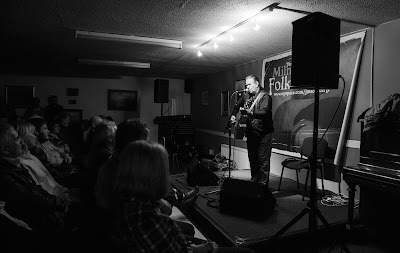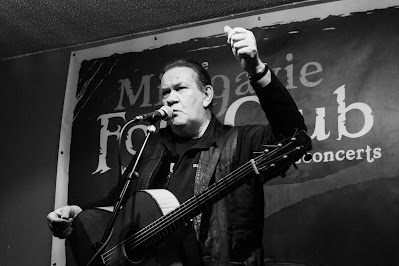.jpg) |
| Neill and Calum MacColl |
Concert for Ewan MacColl Celtic Connections 2015
A
joyous celebration of the life and songs of Ewan MacColl and a family
affair along with the English folk family the Carthys.
MacColl
was many things, a diamond in the rough - a self taught actor, playwright,
author, singer, songwriter, activist, song collector. He is known for his part
in the folk revival movements of the 60s. He wrote one of my favourite songs ever, the well loved - 'The First Tie Ever I Saw Your Face.'
He
is also best known for his songs and tonight we were enriched by hearing them interpreted in the traditional tried and tested way by
some of England’s and Scotland’s finest folk singers - Dick Gaughan, Karine
Polwart, Martin Carthy, Eliza Carthy, The Blue Nile's Paul Buchanan, American
musician Chaim Tannenbaum, Pulp's Jarvis Cocker, his sons Neill and Calum
MacColl, and four of MacColl's grandchildren.
.jpg) |
| Neill and Calum MacColl |
The
event was organized by his two sons (with folk singer Peggy Seeger) Calum and
Neill MacColl, and by Kate St John. His second wife Peggy
was unable to be there due to illness. For
Peggy he wrote one of the most perfect love songs - The First time Ever I saw
Your Face and Neill commented that his parents had a display they called the
'Chamber of Horrors' for some of the dire covers of this now very famous
song.
The band played acoustically and included double bass, accordion
and guitars and with stripped back arrangements so the songs were able to shine
through. On stage there was a backdrop of black and white images of Ewan and
his wife Peggy Seeger.
 |
| Dick Gaughan |
**Some true gems tonight –
Scottish folk legend Dick Gaughan and Karine Polwart
began the concert with a strong interpretation of Ewan's song Ballad of
Accounting. Gaughan also sang a dramatic Father's Song. Karine
Polwart's truly felt cover of the song Nobody Knew She was There.
I especially enjoyed the Blue Nile's Paul Buchanan’s
subtle interpretation of The First Time Ever I Saw your Face which was
full of honest depth and heart and with none of those trills or unnecessary
overdone vocal gymnastics so common these days on reality shows.
.jpg) |
| Eliza Carthy, Norma Waterson and Martin Carthy |
English folk singer Martin Carthy sang with
character Champion at Keeping Em Rolling and Freeborn Man of the Travelling
People. Eliza Carthy performed with honesty and verve the
MacColl songs Alone, Space Girl and The Fitters Song. Martin and
Eliza Cathy were joined by Norma Waterson to sing a moving
interpretation of MacColl's The Moving on Song.
Pulp's Jarvis Cocker sang in his own very unique way the song
The Battle is Done With.
American musician and philosopher Chaim Tannenbaum
impressively joined the cast of players. He sang MacColl's Go Down Ye Murderers and My Old Man and the well-known song
now in the folk cannon, Shoals of Herring. (For 40 years, folk music’s
first family, the Wainwright-McGarrigle clan, has enjoyed Tannerbaum's quiet
support.)
MacColl's grandchildren performed some shanties. Calum MacColl sang the well kent Sweet
Thames Flow Softly and Neill MacColl sang the poignant The Joy
of Living, before the encore songs for us all to sing along with - Dirty
Old Town and Manchester Rambler.
 |
| ChaimTannenbaum |
 |
| Jarvis cocker |
 |
| Martin Carthy |
MacColl
was a fine storyteller with a magic way with words and wrote life-affirming songs. McColl died in 1989 at 74.
His wife, Peggy Seeger, now 80, still tours and records.
She is an American classically trained musician and part of another famous folk
family - the Seegers (Pete Seeger). Her father
was Charles
Seeger, a folklorist and musicologist; her mother was Ruth Porter Crawford, a
modernist composer who was one of the first women to receive a Guggenheim
fellowship.
A four disc boxed set of MacColl’s songs to mark the centenary,
will be released later this year and will include some of the singers at
tonight's show. MacColl's parents were
Scottish
He has released albums twenty solo albums and thirty albums with
Peggy.






.jpg)
.jpg)















.jpg)
%2B2.jpg)
.jpg)
.jpg)
.jpg)
.jpg)

.jpg)
.jpg)



.jpg)
.jpg)
.jpg)



